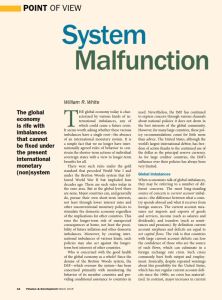Join getAbstract to access the summary!

Join getAbstract to access the summary!
William R. White
System Malfunction
The Global Economy Is Rife with Imbalances that Cannot Be Fixed under the Present International Monetary (Non)System
IMF, 2015
What's inside?
Economist William R. White presents a persuasive argument for harmonizing individual countries’ monetary policies.
Recommendation
The pre–World War I gold standard and the post–World War II Bretton Woods agreement were the last exemplars of a globally coordinated monetary system. Today, countries pursue their own fragmented interests, such as by stimulating their economies with lowered interest rates, without regard to the impacts on other nations or on their own long-term interests. Economist William R. White explains how “the present international monetary (non)system” works against the good of the global economic community. getAbstract recommends this brief but worthwhile article to policy makers, who should heed White on the need for a new postcrisis monetary system.
Summary
About the Author
William R. White is chairman of the OECD’s Economic and Development Review Committee.

















Comment on this summary